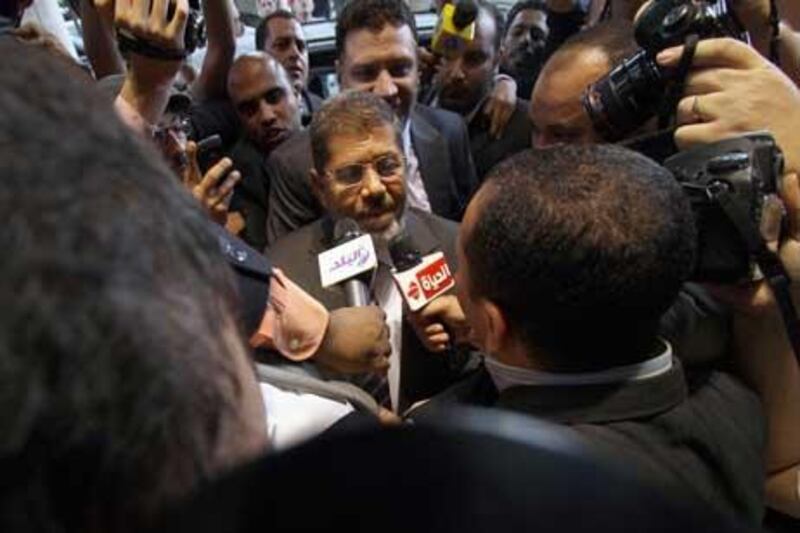CAIRO // The two contenders for the Egyptian presidency who face off in a run-off scheduled for next month were yesterday scrambling to recast their campaigns to appeal to liberals and pro-revolutionary voters who could play a decisive role in who will take the helm in Egypt.
The race is now down to Mohammed Morsi, a prominent Muslim Brotherhood member, and Ahmed Shafiq, who served as Hosni Mubarak's last prime minister during the uprising that forced Mubarak to resign last year. Because neither won more than 50 per cent of the vote, an election law requirement, a run-off will take place on June 16 and 17.
Their campaigns were successful in pulling in voters with their opposite visions for Egypt. Mr Morsi, who won 25.3 per cent of the vote, according to preliminary vote tabulations by local newspapers and political campaigns, appealed to Egyptians who believed in a stronger role for Islam in the state. Mr Shafiq grabbed 24.9 per cent of the votes with his self-portrayal as the strong hand needed to restore security and provide a bulwark to rising Islamists.
But the men now have the difficult task of convincing a large portion of people who voted for more liberal candidates in the middle of the political spectrum to choose them for the presidency. More than 50 per cent of the votes went to Abdel Moneim Aboul Fotouh, a self-styled moderate Islamist who was supported by many conservative Salafists and pro-revolutionary voters; Amr Moussa, the former foreign minister; and Hamdeen Sabahi, a Nasserite who came in third in the first round of voting among a choice of 13 candidates. Turnout exceeded 40 per cent of eligible voters, according to figures from the independent Rasd News Network.
The election was billed as the freest and fairest that Egypt has ever had.
The Muslim Brotherhood said yesterday it would invite two losing candidates to discuss whether they could become the vice president and a "future coalition government", according to a statement yesterday. The invitation of Mr Aboul Fotouh itself represented a dramatic offer of reconciliation because he was expelled from the group for refusing orders not to run for president last year.
"We call on all sincere political and national forces to unite to protect the revolution and to achieve the pledges we took before our great nation," the Brotherhood added.
Mr Shafiq held a news conference, where he attempted to cast himself as a pro-revolutionary presidential candidate. Like Mr Mubarak, Mr Shafiq is a former air force commander and is seen by many as a vote for the continuation of the old regime.
"I pledge now, to all Egyptians, we shall start a new era," he told reporters. "There is no going back."
The choice between the two will prove excruciating for liberal voters, many of whom feel that it has now come down to a choosing the lesser of two evils. The Muslim Brotherhood would assume near dominance over two branches of the government if Mr Morsi wins. The group's political arm, the Freedom and Justice Party, controls nearly 50 per cent of the seats in the parliament.
But Mr Shafiq is considered the most prominent "felool", an Arabic word that is used to describe "remnants" of the old regime, and a rejection of the principles that led to the uprising across the country last year.
Joseph Rizk, an activist and the founder of a public policy group called New Republic, said some activists were considering a grass-roots effort to convince voters to make marks on ballots that would render them nullified. Elections rules say that if five million ballots are invalidated the election is disqualified and must be done over.
But he was planning to vote for Mr Morsi because it would hasten a judgement on whether followers of political Islam can successfully lead the country and create a better economy and free political system.
"I'm saying that we should give them the burden of power so they have no excuses for not performing," he said. "I don't believe in their project, but it's inevitable that they will gain power and I want to see them put to the test."
If the Muslim Brotherhood fails to live up to expectations in their first term of government, liberal politicians will have a better chance at taking control in the future, Mr Rizk said.
The liberal Free Egyptians political party was expected to meet today to decide who to support for the presidency, said Ramy Yaacoub, the chief of staff of the party.
"We are leaning towards endorsing Morsi," he said. "But as an individual voter, I am sincerely torn. I'm stuck between two candidates who I consider my enemies."
The fact that a new constitution had not yet been written because of a dispute between the Islamists in parliament and liberal appointees to the constitutional commission made it even more difficult, he said.
"I can't feel comfortable electing a secret society into power that already have a near majority in the legislative branch and have over time infiltrated the judiciary," Mr Yaacoub said. "They repeatedly have broken promises and abandoned protesters to the security forces."
A spokesman for the party, Ahmed Khairy, told Al Ahram newspaper the result was "the worst possible scenario". He described Mr Morsi as an "Islamic fascist" and Mr Shafiq as a "military fascist".
bhope@thenational.ae
With additional reporting by the Associated Press and Bloomberg News






